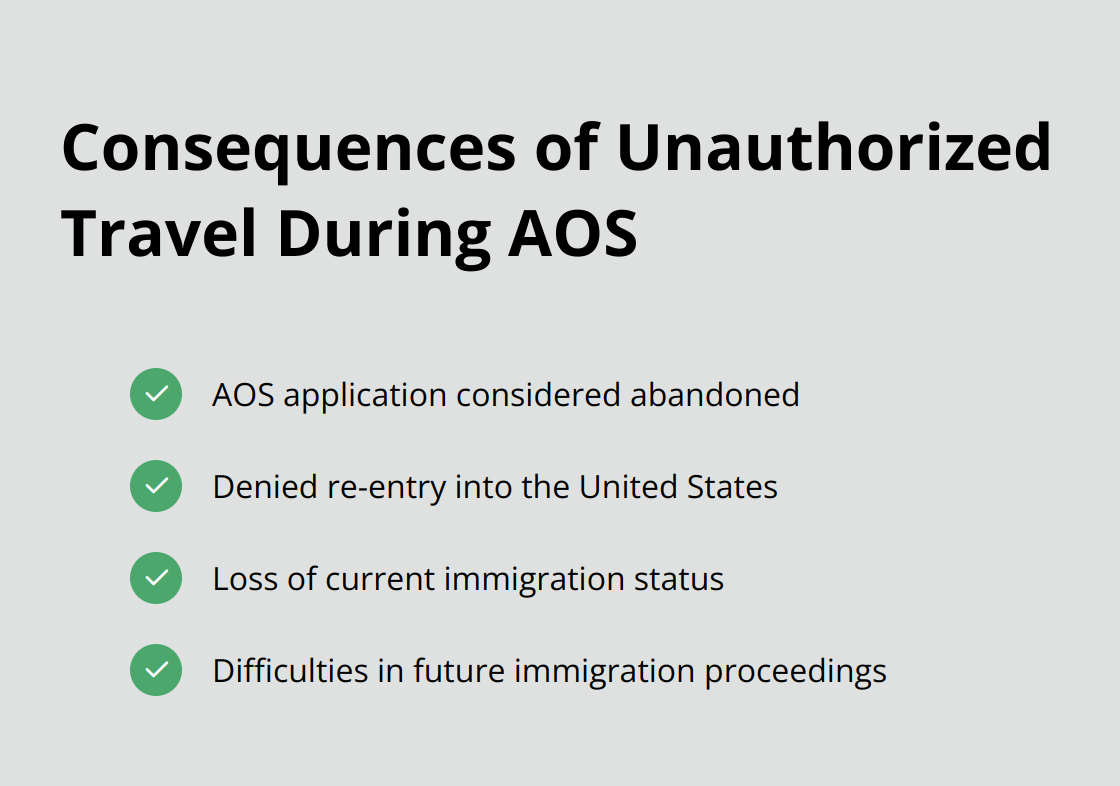
Can You Travel During Adjustment of Status?
At Law Offices of Jeffrey A. Thompson, we often receive questions about travel while Adjustment of Status is pending. Many immigrants wonder if they can leave the United States during this critical process.
Understanding the rules and options for travel during Adjustment of Status is vital to avoid jeopardizing your application. This blog post will guide you through the key considerations and provide practical advice for those who need to travel while their case is in progress.
What Is Adjustment of Status?
Adjustment of Status (AOS) is a pivotal process in U.S. immigration law that enables eligible individuals to apply for lawful permanent resident status (green card) without leaving the United States. This chapter explores the key aspects of AOS, including eligibility criteria, application procedures, and important considerations.
Eligibility for Adjustment of Status
Not all immigrants qualify for AOS. Eligibility typically includes:
- Immediate relatives of U.S. citizens
- Employment-based immigrants with approved petitions
- Certain special immigrants
The AOS Application Process
The AOS process involves several steps:

Applicants must include proof of a qualifying relationship, medical examination results, and financial support documentation. USCIS processing times for I-485 applications vary widely, depending on the category and field office.
Key Considerations During AOS
Maintaining lawful status is essential while your AOS application is pending. Working without authorization or traveling internationally without proper documentation can put your application at risk.
Common Pitfalls to Avoid
To increase the chances of a successful AOS application, applicants should:
- Adhere strictly to all USCIS guidelines
- Maintain valid immigration status throughout the process
- Avoid unauthorized employment
- Consult with an experienced immigration attorney for personalized advice
The complexity of the AOS process often necessitates professional legal guidance. An immigration attorney can provide tailored advice and help navigate potential obstacles that could impede the path to permanent residency.
As we move forward, it’s important to understand the specific travel restrictions that apply during the Adjustment of Status process. These restrictions can significantly impact an applicant’s ability to leave and re-enter the United States while their case is pending.
Can You Travel While Adjusting Status?
The General Rule: Stay in the United States
During the Adjustment of Status (AOS) process, the safest approach is to remain within the United States. Leaving the country without proper documentation can result in severe consequences, including the abandonment of your application. USCIS typically considers an AOS application abandoned if the applicant departs the U.S. without authorization.
Consequences of Unauthorized Travel
Unauthorized travel can have serious repercussions for your immigration status. If you leave the U.S. without proper documentation while your AOS is pending, you may:

Possible Travel Options
While it’s generally advisable to avoid travel, there are situations where it may be possible with proper planning and documentation. The primary way to travel during AOS is by obtaining an Advance Parole document.
Advance Parole is a travel authorization that allows certain individuals with pending immigration applications to re-enter the U.S. after temporary travel abroad. However, it’s important to note that Advance Parole is not guaranteed and must be approved before you leave the country.
To apply for Advance Parole, you’ll need to file Form I-131 with USCIS. The processing times for this document can vary, so it’s essential to plan well in advance of any intended travel. As of July 2025, the average processing time for Form I-131 can change based on USCIS workload and other factors.
It’s worth noting that even with an approved Advance Parole document, re-entry into the U.S. is not guaranteed. Customs and Border Protection (CBP) officers have the discretion to deny entry to any individual they deem inadmissible.
Special Considerations for Employment-Based AOS
For those adjusting status based on employment, there may be additional considerations. Some employment-based visa holders (such as those on H-1B or L-1 visas) may be able to travel using their valid visa stamp instead of Advance Parole. However, this should only be done after careful consultation with an immigration attorney, as it can still carry risks.
The Importance of Legal Guidance
Each AOS case is unique, and what may be appropriate for one individual could be risky for another. Consulting with an experienced immigration attorney before making any travel plans during the AOS process is highly recommended. An attorney can provide personalized advice based on your specific situation and help you understand the potential risks and benefits of travel during this critical period.
As we move forward, let’s explore the specific options available for those who need to travel during the Adjustment of Status process, including how to apply for Advance Parole and what to expect during the application process.
How to Travel During Adjustment of Status
Understanding Advance Parole
Advance Parole is a travel authorization issued by U.S. Citizenship and Immigration Services (USCIS). It allows certain individuals with pending immigration applications to re-enter the United States after temporary travel abroad. This document is essential for aliens who have pending applications for certain immigration benefits and need to travel internationally during the application process.
Applying for Advance Parole
To obtain Advance Parole, you must file Form I-131, Application for Travel Document, with USCIS. The application process involves several steps:

You should apply for Advance Parole well before any planned travel. USCIS recommends submitting your application at least 90 days before your intended departure date.
Processing Times and Considerations
As of July 2025, USCIS processing times for Advance Parole applications vary. You can check the current processing times by selecting your form, form category, and the office that is processing your case on the USCIS website.
When you plan your travel, consider the following:
- Do not leave the U.S. until you have the physical Advance Parole document in hand.
- Ensure your Advance Parole remains valid for the entire duration of your planned trip.
- Be aware that possession of Advance Parole does not guarantee re-entry into the U.S. Customs and Border Protection officers make the final decision on admission.
Risks and Precautions
Traveling during the Adjustment of Status process carries inherent risks. Even with an approved Advance Parole, you may face challenges:
- Your application might be considered abandoned if you leave without proper documentation.
- Re-entry is not guaranteed, even with Advance Parole.
- Extended absences could affect your eligibility for certain immigration benefits.
Try to limit your travel to essential trips only. If you must travel, keep your trips short and maintain strong ties to the United States.
Seeking Professional Guidance
The complexities of traveling during Adjustment of Status often require professional legal advice. An experienced immigration attorney can provide personalized guidance based on your specific situation. They can help you understand the potential risks and benefits of travel during this critical period, ensuring you make informed decisions about your immigration journey.
Final Thoughts
Travel while Adjustment of Status is pending requires careful consideration and planning. The safest approach is to stay in the United States throughout the process. For those who must travel, obtaining Advance Parole is essential to avoid jeopardizing your application.
Proper procedures are paramount when considering international travel during this time. Apply for Advance Parole well in advance of any planned trips, and never leave without the physical document in hand. Keep your journeys short and maintain strong ties to the U.S. to demonstrate your intent to pursue permanent residency.
The intricacies of immigration law can significantly impact your future in the United States. Law Offices of Jeffrey A. Thompson specializes in immigration law and can provide expert advice tailored to your specific situation. Our experienced team can help you navigate the complexities of Adjustment of Status, including travel considerations.


